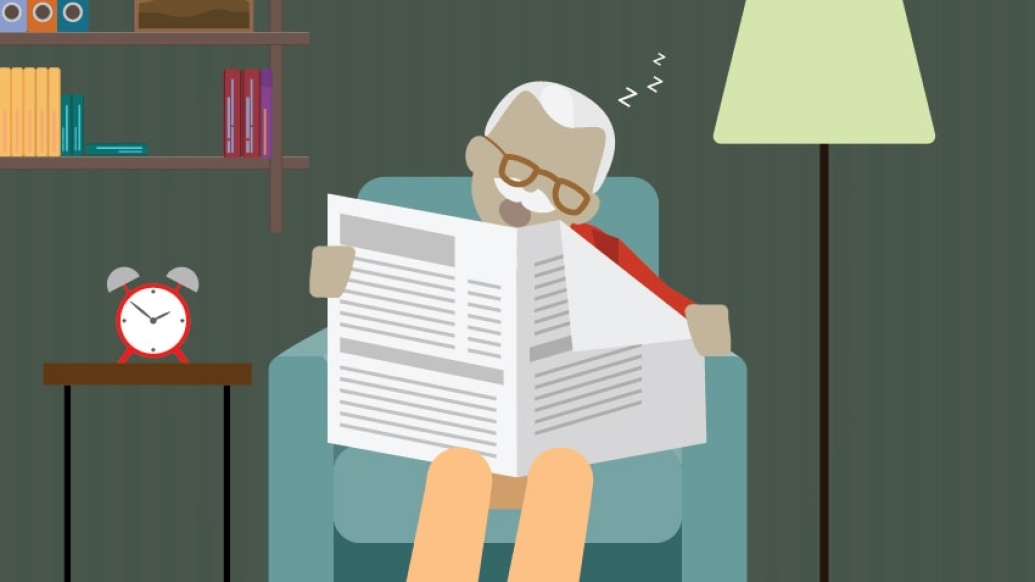Research finds that more than half of Medicare beneficiaries have a high risk of obstructive sleep apnea, but few have been assessed for the sleep disorder.
7:00 AM
Author |

Older Americans are often at a high risk for obstructive sleep apnea, yet this illness remains vastly underdiagnosed, a new study finds.
MORE FROM THE LAB: Subscribe to our weekly newsletter
Michigan Medicine researchers found evidence that more than half (56 percent) of people ages 65 and older have a high risk of OSA, a sleep disorder in which the throat collapses during sleep, causing the patient to repeatedly stop breathing for periods of 10 seconds or longer throughout the night.
But only 8 percent of these individuals have been tested for OSA, a disorder that is associated with significant health risks. An overnight sleep study is necessary to diagnose OSA.
"It appears most older adults who are at risk for obstructive sleep apnea may not be getting referred for overnight sleep studies, and we may be missing an important chance for treatment," says co-first author Tiffany Braley, M.D., M.S., assistant professor of neurology at Michigan Medicine.
'Almost always confirmed'
The data, published in the Journal of the American Geriatrics Society, come from 1,052 Medicare beneficiaries who completed a series of sleep questions and other surveys as part of the National Health and Aging Trends Study (NHATS). The NHATS sample is representative of more than 7 million Americans.
"We see that OSA was rarely evaluated, but when it was, it was almost always confirmed, as nearly all — 94 percent — of those at risk and tested for OSA were diagnosed," says co-first author Galit Levi Dunietz, Ph.D., MPH, postdoctoral research fellow in sleep epidemiology at Michigan Medicine's Sleep Disorders Centers. "This suggests an opportunity to increase the evaluation among older Americans."
The NHATS survey questions about sleep resembled STOP-Bang, a popular questionnaire used in the clinical setting to evaluate common OSA risk factors. The survey evaluated whether respondents were at an advanced age, snored, were overweight, were male, had high blood pressure or felt fatigued.
Among the 94 percent of those who received a diagnosis after being deemed at risk and given a sleep study, 82 percent of respondents' physicians prescribed the first-line treatment. Continuous positive airway pressure, or CPAP, sends pressurized air through the nose, or nose and mouth, to the throat, keeping it from collapsing during sleep.
"It was good to see a high treatment rate after diagnosis, so the main concern is the underdiagnosis of OSA," Dunietz says.
More research needed
"We know that OSA is quite common, yet often underdiagnosed, in adults in the U.S.," Braley says. "But most of the data available are from younger or middle-aged patients."
SEE ALSO: Diagnosing Obstructive Sleep Apnea: New Guidelines Help Doctors Decide
In the young and middle-aged populations, OSA is linked to significant health risks and can worsen quality of life. But in addition to a lack of data on the prevalence of OSA in the older population, Braley says more research is needed to confirm whether the consequences are the same for OSA in older adults.
"This is an important first step in getting to the heart of the question: What is the national scope of OSA, and our ability to recognize it, in all age groups?" she says.
"If we can assume that older adults are subject to the same risks of OSA as middle-aged adults, then missing a diagnosis could ultimately lead to a higher risk of conditions like hypertension, stroke, heart disease, diabetes and depression, as well as cognitive impairment, which is especially important for older individuals. These conditions have serious impact and lead to expensive medical care."
And some older patients may not realize their snoring, sleepiness, tiredness and other symptoms of OSA could be because of something other than normal aging. Those who are already dealing with health conditions such as obesity, diabetes, stroke, a previous heart attack and high blood pressure are more likely to experience OSA as well.
"The results of this study are impressive," says co-author Ronald Chervin, M.D., M.S., professor of neurology and director of the Sleep Disorders Centers at Michigan Medicine. "They amount to estimates, but even so, they help to quantify the magnitude of the challenge.
"We already know that untreated sleep apnea costs billions each year, with decreased work productivity, impaired quality of life and increased medical costs. We still need to learn more about the impact of OSA in older persons more specifically, but the findings of this study suggest a huge, untapped opportunity to improve lives in older years, and perhaps medical costs as well, through more effective diagnosis, and then treatment, of OSA."
The American Sleep Medicine Foundation funded this study. Additional authors included Lynda Lisabeth, Ph.D., MPH; Lesli Skolarus, M.D., M.S.; and James F. Burke, M.D., M.S., all from the University of Michigan.

Explore a variety of health care news & stories by visiting the Health Lab home page for more articles.

Department of Communication at Michigan Medicine
Want top health & research news weekly? Sign up for Health Lab’s newsletters today!





